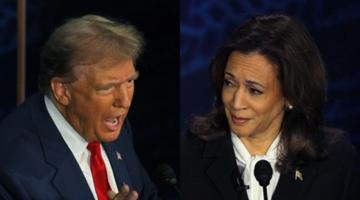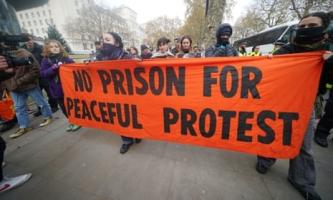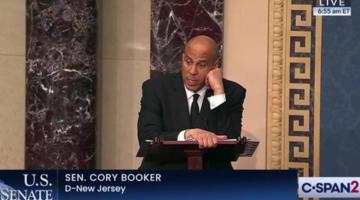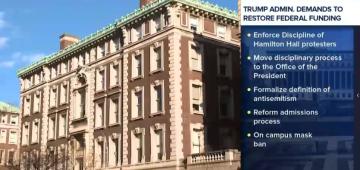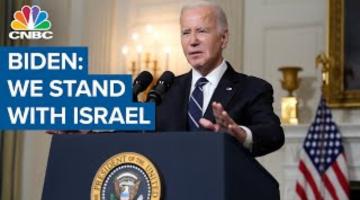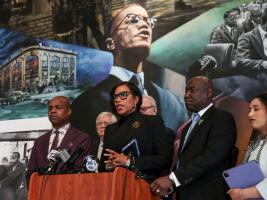Kamala Harris: Your Auntie, AIPAC’s servant.
Any confusion concerning Kamala Harris’ stance on zionism can easily be cleared up by reading her speech to the 2017 policy conference of the American Israel Public Affairs Committee, or AIPAC.
What is AIPAC? AIPAC, a supposedly non-profit organization concerned with social and cultural affairs, is actually the most powerful political lobby in the United States for the occupying zionist entity in historic Palestine. It was formed in 1954 during yet another zionist massacre against Palesitians in the West Bank village of Qibya. The goal of AIPAC was to give cover to the massacre with pro-zionist propaganda. Since that time, AIPAC has become a powerhouse - one of 9 major pro-zionist lobby firms operating in the US. Its power comes from its billionaire donors club, its direct control of US politicians through funding and, lately, near-complete control over the US political process. In 2022, AIPAC created a “political action committee” (PAC) that gave it the ability to provide unlimited funding to US congresspeople. Today, AIPAC funds 342 out of 535 members of Congress, and through this funding – through these open payoffs – it has been able to control US foreign policy towards the zionist terrorist entity.
AIPAC has become even more powerful since October 7, 2023 when Palestinian resistance forces attacked the settler colonial state. Almost a hundred million dollars in donations poured in from some of the richest zionist Jews in the US in the 2 months after October 7th. Now, bold and belligerent, AIPAC promises to punish any US political leader who dares criticize the current genocide of the Palestinian people. It has succeeded in unseating two Black US congress members in the past 2 months and it is confident that it will be able to impact the US presidential election in its diabolical quest to protect the zionist terrorist entity. We were told that Russia interfered with the 2016 elections; AIPAC loudly proclaims its quest to unseat elected government officials without fear of backlash, criticism, or censure. People in the US must ask why it is that this organization is not registered as a foreign agent.
Very few politicians have declined the invitation to express their fealty to the zionist lobby by attending and addressing the yearly AIPAC conferences. Indeed, Kamala Harris has regularly addressed AIPAC to assure the lobby of her complete devotion to zionism. During her 2017 speech to AIPAC, Harris spoke of not only her longstanding personal ties to “Israel” (ties strengthened by her marriage to lawyer Doug Emhoff, Biden’s unofficial adviser on antisemitism), but also of her belief in a robust, pro-Israel political and economic policies on the part of the United States. Harris does not equivocate, proclaiming her support for “Israel’s security and right to self-defense.” She wanted her audience to be clear about her support: “I stand with Israel because of our shared values, which are so fundamental to the founding of both our nations. I believe the bonds between the United States and Israel are unbreakable…” Those “shared values” are those of genocide, white supremacy, and a general depravity.
Now that Harris has been (undemocratically) chosen to be the flag bearer for the misnamed Democratic Party, she has not stepped back from her support for the genocidal zionist entity. Of course, one need not merely listen to her words. One can always judge her actions. A day after voicing support for a ceasefire, the Biden-Harris government released an additional $3.5 billion in military aid to Israel (and as we write, a sale of additional $18.8 billion in military equipment has been approved). As if on cue, the next day the zionist massacred 100 people, mostly women and children, in a school in Gaza City. Nice work, Auntie.
As the Democratic party’s presidential candidate, Kamala Harris is now being feted and deceivingly constructed as a “progressive” candidate. Already, she has gleaned overwhelming support from Black populations. It must be noted that Harris’s campaign has been vague on policy, but her policy position on the genocidal zionist terrorist entity was made clear in her groveling speech to AIPAC.
While this column was initiated to give a platform to the long legacy of Black radical thought, we think it occasionally important to document the treachery of Black misleaders working in the service of U.S. empire. Kamala Harris’s remarks to AIPAC are reprinted below.
Senator Kamala Harris’ Address to 2017 AIPAC Conference, Washington
Good morning, AIPAC, good morning. What an honor. Lillian (Pinkus), congratulations on your outstanding presidency, and it’s great to be with you again this year. I also want to thank AIPAC’s executive director, Howard Kohr, and I’m just thrilled to see all of the students in the audience. In you, I see our future. I want to especially recognize the nearly 1,000 Californians who are here today, and of course including my dear friends and AIPAC board members Anita Friedman and Sissy Swig and Amy Friedkin. And I’m proud to say and be that among the many voices represented here, the California delegation is the largest and hopefully the loudest. There you go.
So having grown up in the Bay Area, I fondly remember those Jewish National Fund boxes that we would use to collect donations to plant trees for Israel. Years later, when I visited Israel for the first time, I saw the fruits of that effort and the Israeli ingenuity that has truly made a desert bloom. I soaked in the sights and sounds and smells of Jerusalem. I stood in Yad Vashem, devastated by the silent testimonies of the 6 million Jews that were murdered in the Holocaust, and we must always remember that solemn promise: “Never again.”
And I did what I often do when visiting a new country: I visited the highest court in the land. And as I toured Israel’s Supreme Court, I was struck by the iconic architecture, which embodies Israel’s founding principles of democracy and rule of law. The design of that building left a lasting impression on me: its straight lines, which represent the immutable nature of truth, while the curved walls and glass represent the fluid nature of tzedek, of justice.
And this is a concept that is personal for me because it’s that same commitment to justice for the voiceless and the vulnerable that led my parents as students to march for civil rights in the 1960s while pushing me in a stroller. And it’s why I became a prosecutor and personally prosecuted everything from low-level offenses to homicides. It’s why I became San Francisco district attorney and was later elected attorney general of California, where I took on, thank you, where I took on transnational gangs, cyber criminals and mortgage fraud.
And that commitment to justice is why I ran to become a United States senator from the great state of California, the point being to continue that fight. And a critical piece of my agenda is the fight to defend and strengthen our national security. As a member of both the Senate Intelligence Committee and Homeland Security Committee, I have a front-row seat to these issues, and I am proud to stand strongly with America’s allies, including Israel.
So let me be clear about what I believe. I stand with Israel because of our shared values, which are so fundamental to the founding of both our nations. I believe the bonds between the United States and Israel are unbreakable, and we can never let anyone drive a wedge between us. Our bonds are rooted in our shared history and are strengthened by the ties between our peoples. And in the words of Shimon Peres, whose loss we mourn so deeply, “For Israel’s existence, we need the friendship of the United States of America.”
And of course he knew that feeling goes both ways, and there’s no question that friendship and our partnership must be unwavering. And I believe that Israel must be — the teleprompter has stopped, and now I’m going to catch it back up. There we are.
I believe Israel should never be a partisan issue, and as long as I’m a United States senator, I will do everything in my power to ensure broad and bipartisan support for Israel’s security and right to self-defense.
I believe that the only viable resolution to the Israeli-Palestinian conflict is two states for two people, living side by side in peace and security.
I believe that a resolution to this conflict cannot be imposed. It must be agreed upon by the parties themselves. Peace can only come through a reconciliation of differences, and that can only happen at the negotiating table.
I believe that when any organization delegitimizes Israel, we must stand up and speak out for Israel to be treated equally.
And that is why the first resolution I co-sponsored as a United States senator was to combat anti-Israel bias at the United Nations and reaffirm that the United States seeks a just, secure and sustainable two-state solution.
And as someone who’s personally prosecuted hate crime, I also believe that we cannot stand by while antisemitism, hate crime and bigotry are on the rise, whether that’s a swastika on a Jewish Family and Children’s Services bus in San Francisco or the burning of a mosque in Tampa.
That’s why I am pleased to announce for the first time here at AIPAC that I’m introducing a Senate resolution that condemns targeting of Jews, as well as any form of religious bias, racism, misogyny or other hateful acts targeting minorities across the United States.
And let’s be candid. Many, including those in this hall, have been directly impacted by the outrageous incidents targeting the Jewish community. This violence and hate is alarming and simply unacceptable.
No one should have to worry about their children’s safety when they drop them off at the JCC.
No one should have to be afraid to put a menorah in their front window or on their front lawn.
And no one should ever have to fear that the grave of a loved one might be desecrated because of their faith.
So my resolution calls on law enforcement to expedite investigations of hate crime and hold perpetrators accountable. My resolution calls on law enforcement to fully report hate crime statistics, and my resolution calls on the administration to support victims and fund security at places of worship and other institutions that have been targeted — of any faith.
And as I fight to promote human rights and security, Israel and the Jewish community will always be a priority for me. And that is why as senator I am particularly focused on three areas where I believe the United States and Israel can expand our cooperation and where California plays an important and central role, and the three are defense, cybersecurity and water security.
So let’s think about it. First, defense. In the midst of uncertainty and turmoil, America’s support for Israel’s security must be rock-solid.
And as Iran continues to launch ballistic missiles while it arms and funds its terrorist proxy Hezbollah, we must stand with Israel.
As Hamas maintains its control of Gaza and fires rockets across Israel’s southern border, we must stand with Israel.
And as ISIS and civil war in Syria destabilize the region, displacing millions and threatening shared security interests, we must support all those affected by ongoing violence and terror, and we must stand with Israel.
Our defense relationship is critical to both nations, which is why I support the United States’ commitment to provide Israel with $38 billion in military assistance over the next decade.
It is why I support full funding for Israel, including for the Arrow, David’s Sling and the Iron Dome missile defense systems, which save lives, and that’s why I am fully committing to maintaining Israel’s qualitative military edge.
At the same time, the United States must never permit Iran to develop a nuclear weapon. The Iran nuclear deal must be vigorously enforced through robust monitoring, inspection and verification. And if Iran cheats, there’s no question Iran must be held accountable.
And so as Iran inserts itself in Syria, including through the deployment of advanced military equipment and missiles that threaten Israel, we must not tolerate Iran fanning the flames of instability and violence in the region.
In addition, Russia’s explicit support for these actions is a direct threat to American interests, and it makes Israel less secure. So I say the Trump administration must be crystal-clear with Putin: Russia must stop its support of Iran. This is a threat to the United States, and it is a threat to Israel.
A second area where I believe we can expand our cooperation is cybersecurity and technology. As cyber attacks expose the vulnerabilities of our most essential systems and infrastructure, the United States and Israel must strengthen our innovation and technological capacities and our defenses together.
Israel has more scientists and startups per capita than any other country in the world. And I’m proud that California, building on the 2014 commitments made by Prime Minister Netanyahu and Governor Brown, has facilitated many of these technological partnerships and investments.
Today, Tel Aviv and Silicon Valley are inextricably linked, ensuring that our two countries remain on the cutting edge. And when I met with Prime Minister Netanyahu last month, I was proud to discuss California’s cyber advancements and the way we can expand those joint efforts.
And the third area of growing cooperation is water security.
So as any Californian in this hall can tell you, water is the lifeblood of our economies and our communities, and because of California’s history of droughts, we know we cannot take water for granted. In this regard, we could not have a better example than Israel. Yes. Israel is a nation that is 60% desert yet so water-secure that it exports water to its neighbors.
And Israel has been a great partner to California in this area. Take, for example, Carlsbad, California, where an Israeli company built a desalination plant, which provides 50 million gallons of water to 400,000 Californians every day. So while the United States and Israel are geographically separated by water, we can also be bound by water.
And I’m eager to champion these three partnerships in the Senate now and in the future and to ensure that California plays a key role in the relationship between the United States and Israel.
So in conclusion, AIPAC, we all know these are difficult times. I stand here clear-eyed about the dangers of division in our country and in our world, understanding why a state for the Jewish people is so essential.
And I also stand here as someone with a lifelong commitment to justice, a lifelong faith in the power of democratic values and the innate oneness and goodness of human beings. And I believe that it’s the common ground that unites so many of us — values like faith, family, respect and empathy — that will see us through.
Just look for example at the response when Jewish cemeteries in St. Louis and Philadelphia were so horribly, horribly vandalized. Muslim activists quickly raised money to restore the headstones, with one organizer posting on social media, quote, “I want to ask all Muslims to reach out to your Jewish brothers and sisters and stand together against this bigotry.”
Common ground.
Look at the words of Elie Wiesel, who I knew personally and loved, when he said, “The opposite of love is not hate; it’s indifference.”
Common ground.
Look at Israel’s Supreme Court, that beautiful place I visited, upon which sits a Tunisian judge alongside an Israeli Arab Christian and a Brooklyn-born Israeli, all presided over by a female chief justice.
Common ground.
Or look at my own life, where a daughter of a South Asian mother and a Jamaican father concluded her own interfaith wedding with her husband breaking a glass and everyone yelling mazel tov.
So that’s who we are, and if we embrace those values that have always made the United States and Israel great, then I believe our two nations will continue to move forward together for years and years to come.
I thank you, AIPAC. Thank you.
Senator Kamala Harris’ Address to 2017 AIPAC Conference, Washington reprinted from the Center for Israel Education.


